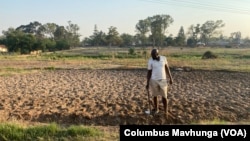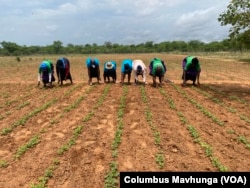Zimbabwe’s government said Wednesday it will compensate foreign investors who lost assets in the country’s controversial land reforms in the early 2000s but were protected by bilateral investment protection agreements.
Zimbabwean Finance Minister Mthuli Ncube said in a statement the government will pay 94 former farmers from countries such as Switzerland, Denmark, Germany, Netherlands and the former Yugoslavia.
The farmers are covered under Bilateral Investment Protection and Promotion Agreements, or BIPPAs, that Zimbabwe signed with the farmers’ countries.
Ncube said $20 million is being paid out of the 2024 budget and another $20 million would come from the 2025 budget.
“This is a very important issue for our arrears clearance and debt resolution process for Zimbabwe, because some of the countries for which we want support, their farmers, their investors, into Zimbabwe were affected by the land reform program in the early 2000s,” Ncube said. “But we're only targeting those countries where the BIPPAs were ratified properly.”
The aim, he said, is to have cleared the entire $146 million liability for BIPPA farmers by the end of 2028.
“We believe that this is very important for building trust, for honoring our commitments,” he said.
Zimbabwe’s government is aiming to rebuild its financial reputation after requesting debt relief and restructuring from international financial institutions and other countries in 2022.
According to the African Development Bank, Zimbabwe's total foreign debt is $21 billion — including interest — which it has been failing to service for years.
However, Eddie Mahembe, an independent economist based in Harare, says resettled farmers, not the government, should pay the $146 million, to prevent increasing the country’s debt.
“Why is the government paying for the farms which were allocated to individuals?” Mahembe said. “They are farming. Some are doing tobacco. They've been selling their tobacco over the years, and we are seeing ... that there is now a move toward giving them title deals. Why is the government assuming that debt?”
Others are concerned that Harare is paying only former farmers of foreign origin. Displaced white Zimbabwean farmers want to be compensated as well, as per a 2020 agreement.
That agreement called for Harare to pay $3.5 billion to the farmers driven off their land under a program backed by then-President Robert Mugabe starting in 2000.
Trevor Gifford, former head of Zimbabwe’s Commercial Farmers Union, said, “Twenty-five years from the start of land reform in Zimbabwe, the majority of displaced title deed holders remain destitute due to the nonpayment of compensation. The government failed to honor its commitment on paying [on time] under the global compensation agreement, which is now expired.”
He said the government’s move to give title deeds to the farmers who took over the land will create confusion and keep away foreign investors.
“The issuing of title deeds on top of existing title deeds, which have still not been paid for in terms of the international norms for land reform, is reckless and does not create any confidence for prospective investments in Zimbabwe,” Gifford said.
Graham Rae was displaced from his farm about 100 kilometers east of Harare and is now farming in neighboring Zambia. He said that until he is compensated, he will not surrender title deeds to the land for which he was dispossessed.
“You can't steal a car and then sell it to me and think you've washed your hands and now it's a legal car,” Rae said. “It's still illegal and by the mere fact that I'm buying a stolen car from you, I'm complicit in the theft, so there are going to be lots of problems. I find that fraudulent, I just find that very sad that Zimbabwe has regressed into a basket case where there's no rule of law, and that the rule really is at the barrel of a gun — if you don't agree, you disappear.”
For now, the Zimbabwe government says it will issue titles to the resettled farmers so that they can use them to borrow money for capitalization of their businesses.





